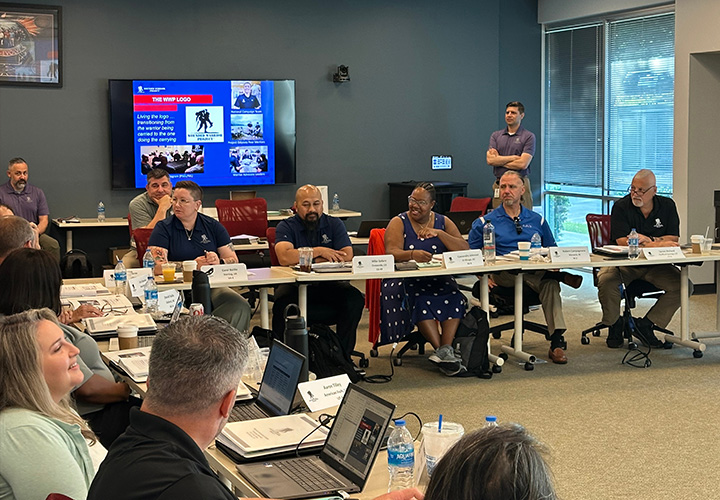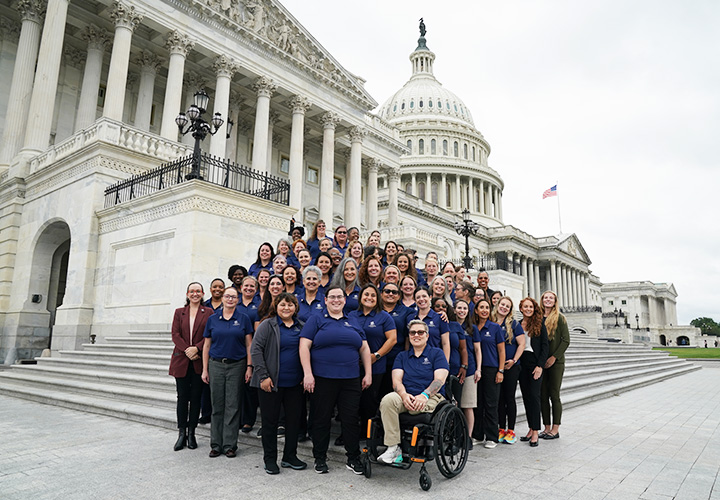Government Affairs Fellow: Teneka Nieves
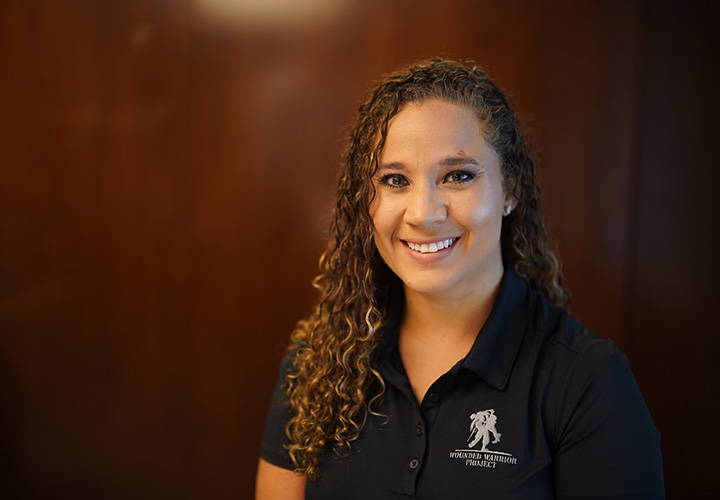
In 2024, the WWP Government and Community Relations team welcomed our first DoD Skillbridge Fellow, Teneka Nieves. Teneka is a Transition and Wellness Resource Coordinator in the United States Army, and after 16 years of service, she has begun her transition out of the military.
DoD connects Service members to programs like Skillbridge to help them gain civilian work experience through training, apprenticeships, or internships during their last 180 days of service. Partners like WWP have developed specific SkillBridge programs to help Service members transition into the civilian career workforce.
Through her fellowship at WWP, Teneka has served as policy analyst supporting the efforts of the government Affairs team.
Q: What prompted you to transition out of the military after 16 years of service?
My military career came to an end when I had an accident while pregnant. That moment forced me to confront the reality of my situation and reassess everything that truly mattered. The sense of duty and passion that once fueled me in the Army was no longer the same. The injuries I sustained, coupled with the worsening of my PTSD, left me standing at a crossroads. As a result, I’m now undergoing a medical evaluation board. After 16 years of dedicated service, I had to face the difficult truth that it was time to transition out of the military and begin a new chapter of my life.
Q: How has your fellowship with WWP impacted your career goals post-military?
My fellowship with WWP has been transformative in shaping my career goals post-military. By joining the WWP government affairs team, I've been able to directly channel my experiences and passion for advocacy into meaningful action. It’s not only deepened my understanding of the challenges veterans face but also amplified my ability to effect change on a broader scale.
This role has given me a platform to continue advocating for fellow veterans, leveraging my military background to drive legislative and policy advancements that directly impact their lives. It’s allowed me to take the skills I developed during my service — leadership, strategic thinking, and resilience — and apply them to the vital work of improving veteran support systems.
Q: You’re also involved in advocacy efforts as a WWP Warrior Advocate Leader. How did you get involved in that program?
I became a Warrior Advocate Leader (WAL) because I wanted to be more than just a voice for myself. I wanted to be a voice for others who’ve walked similar paths but might not have the platform to share their stories. My time in the Army showed me firsthand the sacrifices and struggles we face, especially as women veterans, and it fueled a deep commitment to stand up and speak out. Our stories and experiences matter, and they need to be heard.
Through advocacy events like the Women Warriors Summit, I have the opportunity to share my journey and draw attention to our unique challenges. I’m here to ensure that our contributions are recognized, our needs are met, and our resilience is celebrated.
Q: In what ways has your fellowship expanded your leadership or strategic thinking skills?
My fellowship with WWP has expanded my leadership and strategic thinking skills in ways I never imagined. Being part of the government affairs team has challenged me to step into a new arena, one where my voice and experiences as a veteran can influence decisions that affect thousands of others. This role has pushed me to think beyond immediate challenges and look at the long game — crafting strategies that will create lasting change for veterans across the nation.
It’s no longer about just leading a team; it’s about leading a movement. I’ve had to sharpen my ability to analyze complex policies, understand the nuances of the legislative process, and find ways to collaborate with diverse stakeholders. Every day in this fellowship, I’m using my military-honed discipline and adaptability to navigate unfamiliar territory while staying laser-focused on the mission: advocating for my fellow veterans.
Q: What are the most significant lessons you learned during your fellowship?
I’ve learned about the power of advocacy, the importance of collaboration, and the true meaning of purpose after military service.
I realized that our voices as veterans are incredibly powerful when we speak with conviction and clarity about the issues that matter most. I learned how to turn my personal experiences into meaningful dialogue with policymakers, translating the challenges I and other veterans face into actionable change.
Collaboration has also been a major lesson. In the military, I was used to leading teams in a structured, hierarchical environment. But in this fellowship, I’ve learned the value of working alongside diverse stakeholders — government officials, nonprofit leaders, fellow veterans — and how combining our unique strengths creates a far greater impact than any one of us could achieve alone.
This fellowship has also reaffirmed for me that purpose doesn’t end when we take off the uniform. I learned that my mission continues, just in a different capacity.
Q: What do you want to do after you finish your fellowship?
I’m still unsure where I will end up, but I know that my passion lies in helping people. As long as I am making a positive impact on others' lives, I believe I’ll eventually find where I’m meant to be.
Right now, I’m focused on learning and growing through the fellowship, knowing that each experience brings me closer to that place where I can make the most difference.
Q: What advice would you give Service members and veterans on transitioning to the civilian workforce?
Remember that your military experience is invaluable. The leadership, discipline, and resilience you’ve developed in the service are your greatest assets, and they’re in high demand in the civilian workforce. Embrace the opportunity and go into it knowing that your service has prepared you for this next chapter of your life.



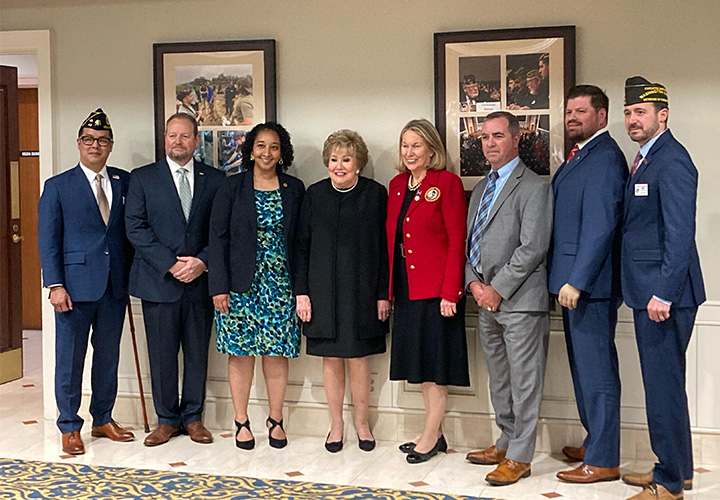
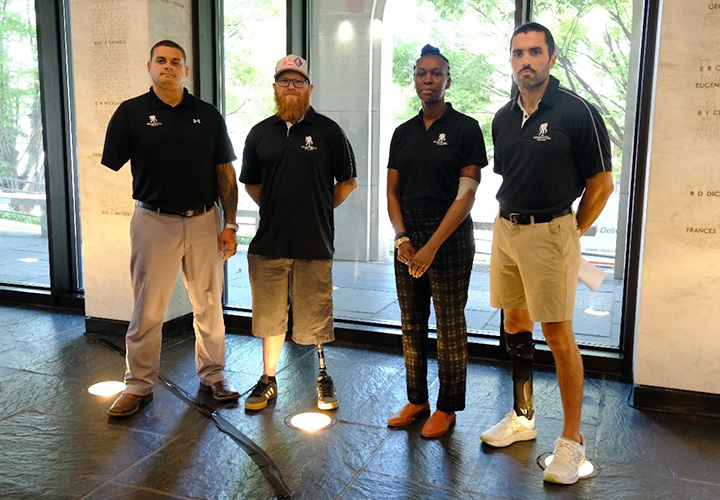
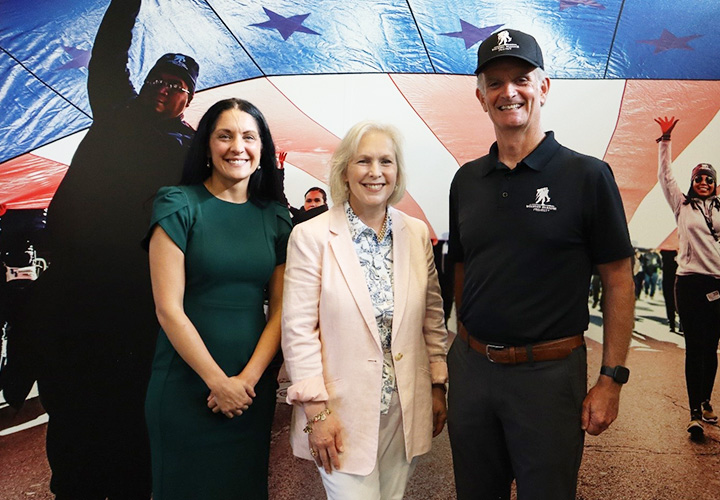
 Rep. Miller-Meeks, representing the first congressional district of Iowa, has used her position as Chairwoman of the Veterans Affairs Subcommittee on Health to sponsor pivotal legislation that positively impacts veterans' lives. She helped lead efforts to make VA’s health care system more accessible and accountable by sponsoring the Veteran Care Improvement Act (
Rep. Miller-Meeks, representing the first congressional district of Iowa, has used her position as Chairwoman of the Veterans Affairs Subcommittee on Health to sponsor pivotal legislation that positively impacts veterans' lives. She helped lead efforts to make VA’s health care system more accessible and accountable by sponsoring the Veteran Care Improvement Act ( Sen. King of Maine has used his membership in both the Committee on Armed Services and the Committee on Veteran’s Affairs to champion the needs of veterans and their caregivers by advocating for legislation that helps them access the benefits they have earned. He has worked to ensure veterans' benefits keep pace with inflation through the Veterans’ Compensation Cost-of-Living Adjustment Act of 2023 (
Sen. King of Maine has used his membership in both the Committee on Armed Services and the Committee on Veteran’s Affairs to champion the needs of veterans and their caregivers by advocating for legislation that helps them access the benefits they have earned. He has worked to ensure veterans' benefits keep pace with inflation through the Veterans’ Compensation Cost-of-Living Adjustment Act of 2023 ( Rep. Mariannette Miller-Meeks (IA-01) serves as Chairwoman of the House Committee on Veterans Affairs Subcommittee on Health and has advocated for veterans, working on issues like substance use disorder, organizing care, and new mental health treatments, among many others. She also has helped lead efforts to make the VA health care system more accessible and accountable.
Rep. Mariannette Miller-Meeks (IA-01) serves as Chairwoman of the House Committee on Veterans Affairs Subcommittee on Health and has advocated for veterans, working on issues like substance use disorder, organizing care, and new mental health treatments, among many others. She also has helped lead efforts to make the VA health care system more accessible and accountable.
